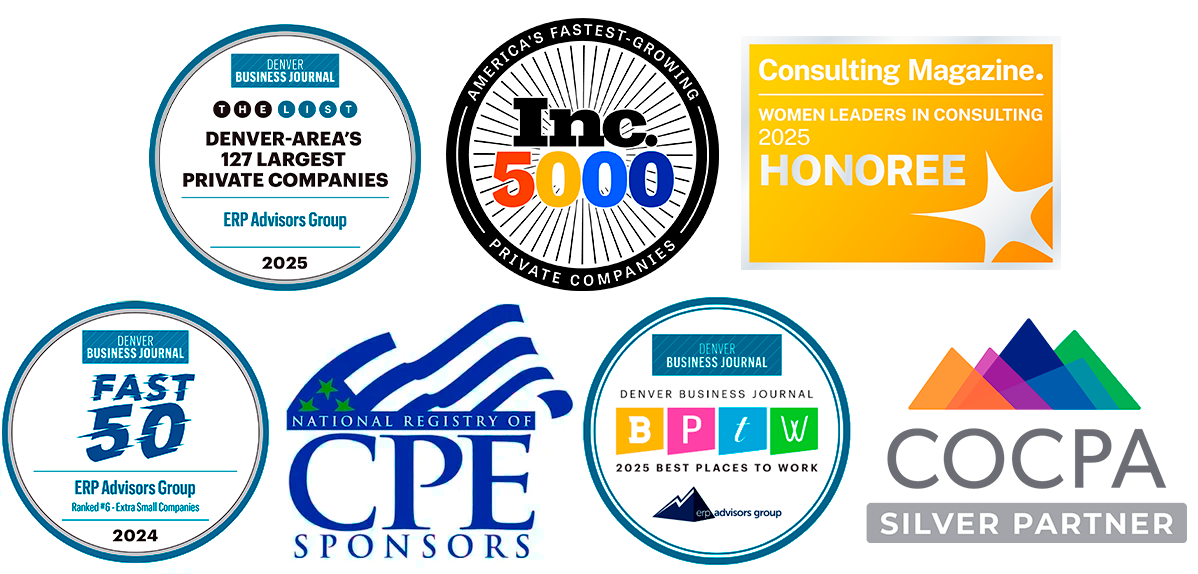
There are 1000 ways to get your ERP Selection wrong, so how can you ensure you get yours right? Successful businesses lean on ERP selection consultants to guide their needs analysis and software evaluation. An advisor can make sure you are absolutely certain you select the right software and implementation services for your company. Selecting the wrong software may waste valuable resources – not just time and money but disruption and delays can cause a sponsor to lose credibility with executives and stakeholders. The wrong decision can even lead to getting fired! Tune in to this episode of The ERP Advisor, where Shawn Windle will outline why you should hire an ERP selection consultant.
There are 1000 ways to get your ERP Selection wrong, so how can you ensure you get yours right? Successful businesses lean on ERP selection consultants to guide their needs analysis and software evaluation. An advisor can make sure you are absolutely certain you select the right software and implementation services for your company. Selecting the wrong software may waste valuable resources – not just time and money but disruption and delays can cause a sponsor to lose credibility with executives and stakeholders. The wrong decision can even lead to getting fired! Tune in to this episode of The ERP Advisor, where Shawn Windle will outline why you should hire an ERP selection consultant.
Why Should You Hire an ERP Selection Consultant
If your company is in the market for a new ERP, you have probably heard the horror stories: companies making the wrong ERP selection, struggling with implementing it, and finally giving up after hundreds of thousands of dollars have been lost.
Let’s look at an analogy of building an extra room onto your house. You may have enough understanding and experience with fix-it projects to feel confident in managing the updates yourself. But the average do-it-yourselfer is virtually guaranteed to face obstacles along the way because the scope of such a project is so immense. Many of these obstacles become too difficult to overcome, and they end up searching for a professional to complete the job.
ERP software is much more complex than a room addition: you’re trying to automate the complex business processes of an entire organization. It is one of the most important things to get right.
The Importance of Getting Your ERP Selection Right
Selecting the correct software could be the difference between a successful project and complete failure. Implementing a solution that does not properly match your business’s needs could lead to a number of internal issues, from failed change management to testing complications with the partner and vendor. And these issues will likely equate to a complete rejection of the system.
Part of getting your ERP selection right is selecting a solution to prepare your business for the future. The quest to replace your ERP will be a massive investment for your entire team, making it vital to choose a solution that will meet your current needs now, as well as your business’s expected needs 10+ years from now. As the foundation for your business operations, your software needs to have the capability to leverage advancing technologies and a vendor who is actively investing in the development of their products.
What Happens If You Don’t Get It Right?
Getting your selection wrong could lead to disastrous consequences for your business and the decision makers involved in the process. These include:
- Inability to Use Your System: Your new ERP will need to be able to handle all of the specialized, industry-specific functions necessary to run your business day-to-day. If not, your newly purchased software could end up being entirely useless to your team or struggle to integrate well with other additional applications you need to buy.
- Loss of Money and Time: ERP software is a large cash investment, immediately up front and yearly over the life of the solution. If the software you implemented is not the right fit for your business, it will not be as simple as just changing software again. Once you are locked into a contract with a vendor, it is very difficult to get out of it, and your budget for business software will remain tied up in subscription costs.
- Lack of User Adoption, High Turnover: While it is always exciting for employees to have new, fancy tools to take advantage of, if nobody actually understands how to use it (or don’t want to), what was the point of implementing it? And if training is complicated, it could lead to employees leaving out of frustration.
- Business Delays: If your new system is not properly adopted and does not meet your specific needs, your business could be delayed significantly, impacting your customers and vendors.
- Executives and Stakeholders Lose Credibility – and Even Jobs: The sponsors behind the choice could find themselves under scrutiny if they make an incorrect software selection that causes significant problems. In some cases, this can even lead to individuals being fired!
What an ERP Selection Consultant ACTUALLY Does
A consultant can provide services to ensure these pitfalls don’t derail your ERP selection, and they do so by being true advisors. An ERP selection consultant is not just a technician, but an expert on your business. They will take the time to understand your company and its innerworkings, allowing them to truly evaluate what is happening behind the scenes and identify where the business is going.
In order to effectively scour the market and compare available products, you must know all about your business’s needs and processes. Otherwise, software vendors will not be able to provide a complete overview of the system, potential modules, and plug-ins you will need. A consultant can utilize their previous project experiences, as well as their general business expertise to help you narrow down and document your real needs. They will also help identify the underlying data structures present.
ERP selection consultants are also master communicators, filling gaps between your team and the vendor. They can assist in communicating your established needs to the vendor through RFIs and ensure they know what you are actually looking for. Then, when it is time for demonstrations, your consultant can facilitate and drive the process, making sure the vendors show the functionality that you need to see and leave out the parts you don’t.
Finally, a consultant will help you with the most complicated part of software selections: contract negotiations. While consultants are not lawyers, they evaluate contracts on a daily basis and have established relationships with the vendors. This means you get the best discounts and deals possible for your initial fees, recurring costs, and renewal caps.
The Difference a Consultant Makes
At their core, ERP selection consultants are “match makers.” They will steer you towards the right software options while also identifying the right implementation resources and making introductions before the contract is even signed. Because selection consultants are familiar with your stakeholders and executives, they are well positioned to recommend and coordinate between the vendor and client. One of the greatest obstacles vendors face is being unsure who to delegate tasks to at the client. A selection consultant will guide these communication channels to efficiently and effectively progress the project.
Without a consultant, ERP projects often require an average of at least 10 to 15 hours a week of an internal person’s time to work through the ERP selection process. Additionally, that individual will need to learn all there is to know about ERP implementation, especially if they don’t already have previous experience. They will also face the reality that those extra 15 hours will be on top of their day job responsibilities. A consultant will sound the alarms when key tasks are falling behind, and step in to help complete those tasks when needed.
Who Can Benefit from an ERP Selection Consultant
While not every business is large enough for a selection consultant’s full services, all businesses, across all industries, can benefit from an advisor in some way. Software selection is an intricate process that takes significant time and experience to master. Therefore, it is not easy to jump right in. But in order to be successfully supported by a consultant, you have to know what you don’t know. The decision to hire an ERP consultant is on the shoulders of a senior executive who knows their people, their capabilities, and their availability. This person may arrive at the conclusion, “We just can't do this on our own, and I'm willing to hire somebody to help us.”
In most cases, an ERP consultant will be most useful to mid-sized businesses, usually approaching $20 million or more in revenue. Rapidly growing businesses without a dedicated IT department can also benefit from the full services of a selection consultant. However, companies smaller than that may end up spending more on a consultant than the software itself or simply may not be ready to upgrade from their current software.
Conclusion
Ultimately, an ERP selection consultant will ensure you choose the correct solution for your business for now and the future. They will also help you to understand your business on a much deeper level and position you for a successful implementation.
If you are looking to undergo an ERP transformation, knowing you need external support is often the first step towards a successful project. Contact us today to engage with our free introductory services. We offer free consultations to discuss your project with you, and we are completely transparent; we will help you figure out how to proceed, whether that involves our services or not. Talk to us today!





